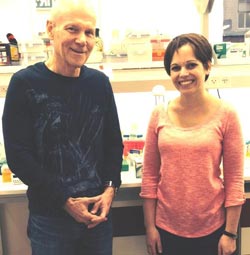New treatment proposed to prevent devastating intestinal inflammation in cancer patients

Prof. Yinon Ben-Neriah (left) and Naama Kanarek<br>
Experimental work pointing to a therapy for alleviating mucositis — a common, severe side effect of chemotherapy and irradiation of cancer patients or patients prepared for bone marrow transplantation – has been achieved by an international team of researchers from the US and Israel headed by scientists at the Hebrew University of Jerusalem.
Mucositis is a strong inflammatory reaction of the mucosal lining of the digestive system, particularly the gut. Mucositis is often a major reason for premature suspension of anti-cancer therapy. As of today, there has been no effective means of preventing mucositis or its treatment.
The research group at the Hebrew University specializes in genetic engineering of mouse models (GEMMs) of inflammation and cancer. Naama Kanarek, a doctoral student at the Lautenberg Center for Immunology and Cancer Research and the Institute for Medical Research Israel–Canada at the Hebrew University Faculty of Medicine, constructed a mouse model designed to study the effect of deleting a gene encoding the enzyme beta-TrCP.
This enzyme was discovered in the laboratory of Hebrew University Prof. Yinon Ben-Neriah 15 years ago, in collaboration with the Israeli Nobel Laureate Prof. Aaron Ciechanover, as a major regulator of inflammatory cascades.
Kanarek found that beta-TrCP deletion in the gut causes mucosal DNA damage, mimicking the effect of chemotherapy and irradiation. Similarly to human patients, she showed that a severe mucositis reaction occurred in mice who were genetically engineered to be beta-TrCP-deficient.
Tracing the pathological basis of the mouse mucositis revealed that the source of the problem was Interleukin-1 (IL-1 beta), a protein secreted by the stressed mucosa. IL-1 beta was found to abnormally open the gut lining, allowing gut bacteria to penetrate and destroy the gut interior. Most importantly was Kanarek’s observation that treating the mice with an antibody which blocks IL-1 beta prevents the onset of mucositis in the beta-TrCP-deficient mice.
Based on these findings, the researchers proposed that IL-1b beta blocking reagents, like Anakinra (Kineret), which is used for treating certain chronic inflammatory conditions like rheumatoid arthritis and Crohn’s disease, should be tried for preventing mucositis in humans.
The work of the researchers was published recently in the American journal PNAS.
(A higher resolution version of this photo is available via e-mail upon request)
CONTACT:
Jerry Barach, Hebrew University Foreign Press Liaison
02-5882904 (international: 972-2-5882904)
jerryb@savion.huji.ac.il
Or Ofra Ash, head of Marketing & Communications
02-5882910, 054-8820425
e-mail: ofraas@savion.huji.ac.il
Media Contact
More Information:
http://www.huji.ac.ilAll latest news from the category: Health and Medicine
This subject area encompasses research and studies in the field of human medicine.
Among the wide-ranging list of topics covered here are anesthesiology, anatomy, surgery, human genetics, hygiene and environmental medicine, internal medicine, neurology, pharmacology, physiology, urology and dental medicine.
Newest articles

High-energy-density aqueous battery based on halogen multi-electron transfer
Traditional non-aqueous lithium-ion batteries have a high energy density, but their safety is compromised due to the flammable organic electrolytes they utilize. Aqueous batteries use water as the solvent for…

First-ever combined heart pump and pig kidney transplant
…gives new hope to patient with terminal illness. Surgeons at NYU Langone Health performed the first-ever combined mechanical heart pump and gene-edited pig kidney transplant surgery in a 54-year-old woman…

Biophysics: Testing how well biomarkers work
LMU researchers have developed a method to determine how reliably target proteins can be labeled using super-resolution fluorescence microscopy. Modern microscopy techniques make it possible to examine the inner workings…





















